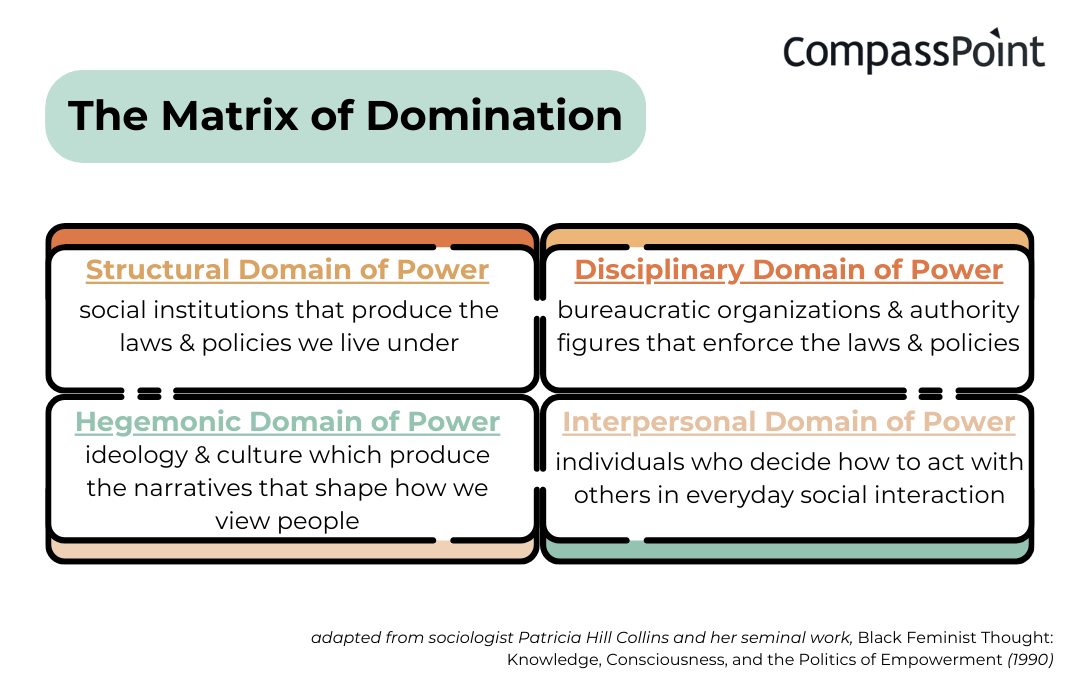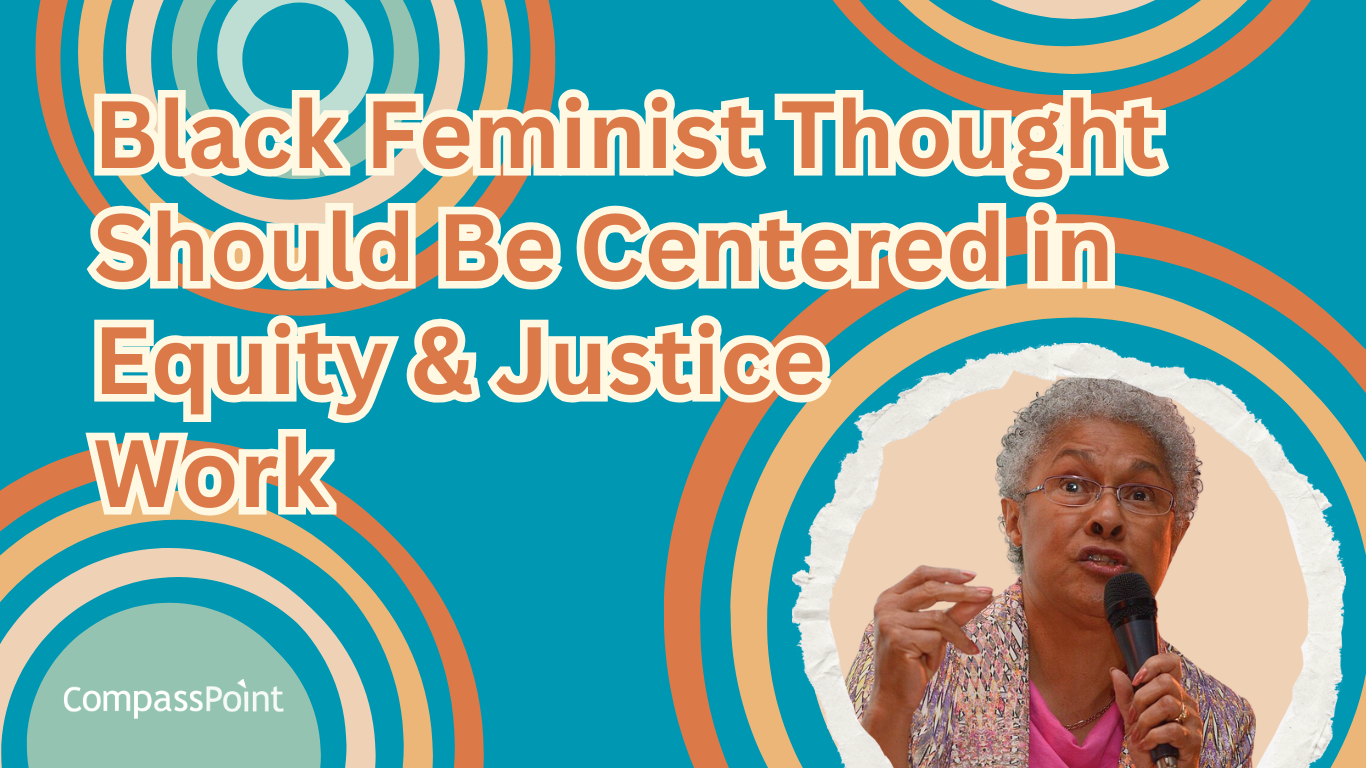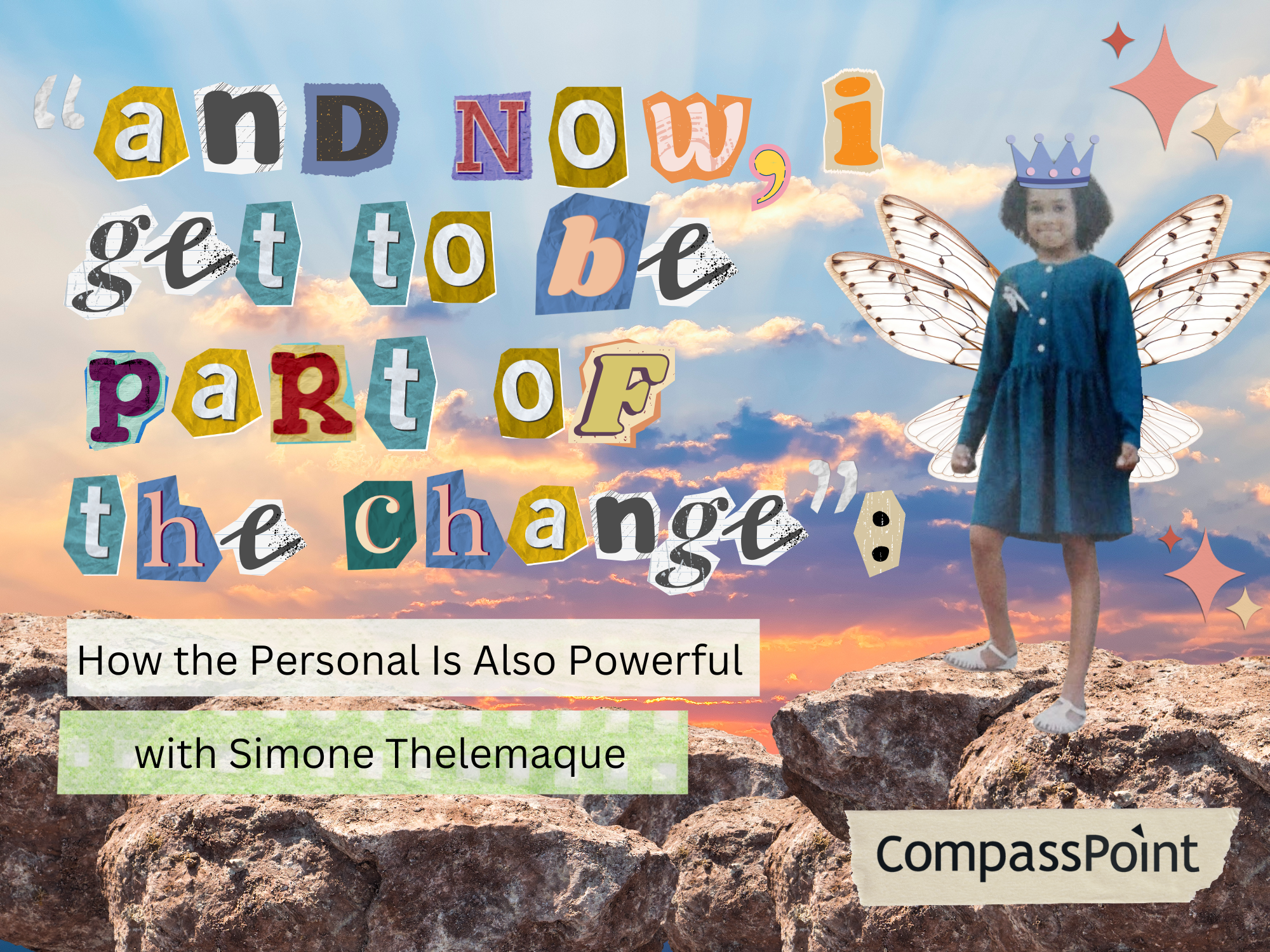[Image description: A graphic made up of colorful concentric circles set against a blue background features big orange, left-justified text outlined in off-white that reads "Black Feminist Thought Should Be Centered in Equity & Justice Work." A picture of Black feminist sociologist, Patrica Hill Collins, is housed in the center of a concentric circle on the bottom right of the image. The CompassPoint logo is featured in the center of a smaller concentric circle on the bottom left.]
Photo of Patricia Hill Collins by Valter Campanato/Agência Brasil via Wikimedia Commons and licensed under the Creative Commons Attribution 3.0 Brazil license.
Joe Jackson, Co-Creator and Co-Facilitator of CompassPoint’s latest program offering, Building Equitable and Just Organizations Through Individual and Relational Practices, shares why you should register for this learning series and reflects on the importance of Black feminist thought in equity and justice work. He also breaks down the Matrix of Domination framework from Black feminist, sociologist, and academic Patricia Hill Collins while offering clear examples of how power and privilege impact our everyday lives.
Joe Jackson interviewed by Learkana Chong
Can you share with our community an overview of what Building Equitable and Just Organizations Through Individual and Relational Practices is?
It's a workshop that supports people in learning some frameworks that support us to act and practice workplace equity and justice. It also helps to onboard people who may be newer to understanding some of these ideological frameworks. The idea is that what people can walk away with is a firmer understanding of how to think about racial justice, gender justice, disability–all the things, right, within the context of their own lives and their workplaces.
How would you define equity and justice, and what that looks like in workplaces?
It's hard to isolate this to just the workplace right, because this is about how we move in society as a whole. In defining equity just broadly, I look at this—at the heart of it—as just fairness. Being thoughtful and fair to the unique situations that individuals are in. Justice to me is fairness and the application of that. So if we look at workplace equity and justice, what we're really trying to figure out is, how do we make sure that we are treating people fairly based on their individual circumstances and needs?
What made you want to create this specific program offering?
Yeah, there's two parts to that. So one, the idea was, we needed to get people on the basics of thinking about equity and justice in the workplace, right. Equipping people with the language, some concepts they can apply—not everybody’s had access to this. So wanting to create a situation where we get everybody on the same page and have the same information that they're going to use together to advance equity and justice in their own workplaces.
So that was something that I was trying to create. What can we do that gives people the fundamentals? And then the second, and what I think is the most critical piece is, what does it look like to apply this? And so what I wanted to do was create something that addresses the reality that many of us are not decisionmakers in our organizations. Some of us are working in nonprofits that aren't doing equity and justice, and that are led by people who either flat out aren't doing it, or led by people who think that's what they're doing, and it's really not. And so many of us don't have the positional power to implement change around this. So what I wanted to address is, what can you, as an individual, actually do.
Speaking of how this training is intended to lay some of the fundamental frameworks down for people who may be new to work in equity and justice, I wanted to ask about one of the core frameworks that is introduced in this program offering: the Matrix of Domination, theorized by Black feminist sociologist and academic, Patricia Hill Collins. Can you explain in layman's terms what the Matrix of Domination is?
Yeah, so Patricia Hill Collins basically comes up with a framework for thinking about how power operates in our society, and how that power is used to oppress people, right. And so the short end of it is, she thinks there's four domains that interlock and interact with one another. So it's not linear. It's not like they're all separate. They cooperate with one another to utilize sources of power to oppress groups of people. Those domains include the structural domain, the hegemonic domain, the disciplinary domain, and the interpersonal domain.
So the structural domain—the short end of that is, basically, the policies and laws that we have to live under. An example of that would be our policies and laws around citizenship. Right, a bunch of laws that outline what literally my rights and privileges as a citizen are. And what rights and privileges will be denied to people that aren't citizens.
And then there's the hegemonic domain. Short end of that is culture. It is the way in which we are given scripts to think about people. Patricia Hill Collins here talks a lot about the controlling images that we’re met with. And so, for example, here it may be when you're looking at the news lately, it always seems to be that when some hideous, horrible, violent crime is committed by somebody who's “undocumented” and “illegal,” we're told that “This rapist who is ‘illegal’ or undocumented did this thing!” But you know what? When that boy went and shot up that school in Georgia, they didn't say he was a citizen of the United States. The boy that tried to shoot the former President—they didn't say, this is a citizen of the United States.
So what's happening here is that there is a controlling image that's getting created via our media, that links being undocumented with being a violent criminal, and also links that to being brown. That is now the controlling image of an “immigrant.” So that would be an example.
And then, there's the disciplinary domain and short end of that is this is where policies and laws are enforced and enacted. So we could think of our workplaces as the site in which that happens, right, where we're enforcing laws. An example I might give is, there are laws around who can work based on citizenship status, and our jobs will ask for things like IDs and addresses to prove whether or not you're authorized to work in this country, regardless of the skills and talents you might actually bring to the table. So this would be an example of the enforcement in the bureaucratic space of these laws.
And then the final one is the interpersonal domain, and the short end of that is how each individual acts. An example I might give is if I let the controlling images seep into my mind—we also have the legal structure, policy structure happening, that makes me have a little bit more or a lot more privilege and power as a citizen than someone who isn't—and I perceive the person that lives across the street from me as undocumented, right? My behavior could be, “Hey, we got some extra barbecue over here at our party, want some?” Or I could be like, “I think these people don't belong here. Let me call ICE” if they don't do something I want them to do. So I can choose to be the oppressor in my own behavior, regardless of my individual identities. I mean, I'm a Black transgender man. But in this particular situation, I'm a citizen where someone who may not be—that allows me to have privilege and power as an individual, and what I do with that dictates the level of oppression or resistance to oppression that's enacted in the interpersonal.

[Image description: An infograph visualizing Patricia Hills Collins' Matrix of Domination framework.]
Thank you for that. So a follow-up question is, why did you decide to include this framework, the Matrix of Domination, in this particular training, and how is this framework relevant in an organizational context?
Yeah. Well, I thought it was super important to make sure that we have a conversation about power, right? I wanted to forward the work of some of our Black intellectuals out here, and Patricia Hill Collins has that, and provided that. But I also feel like, because this workshop focuses on what we can do as individuals, then it means that we have to do the work on that interpersonal level. So while I'll go through the Matrix of Domination in this workshop, I will focus mainly on the interpersonal level in terms of, “Let's talk about what it looks like to practice, and what application can look like.”
And the reason why that's important is because a lot of us who think about power and privilege and oppression, especially those of us who are folks of color and have multiple marginalized identities—we don't tend to see where we have power and where we are privileged. And this work that Patricia Hill Collins does, calls for us to actually do what she calls critical self-reflection. That critical self-reflection will allow a Black transgender man from a working class background to realize, actually, there are areas that I do have power and privilege like my citizenship status, like my education level, like my income at this time, relative to people who don't have these things.
And so what does it look like for me, as an individual, to do the work, to be conscientious, to do the critical self-reflection to identify my power and privilege? And then what are the practices that I can develop around how I mitigate or eradicate power imbalances and use my power in service of good, where I can?
Speaking of Patricia Hill Collins, and how this Matrix of Domination framework is part of a book she wrote, Black Feminist Thought, what role do you think Black feminist thought in general has played or should play in the field of leadership and organizational development? And what challenges or trends are you noticing of that relationship?
Well! I think that Black feminist theory, when we're an organization who wants to be doing equity and justice work in particular, should actually be centered, along with decolonized thought—colonial women feminism, Latina feminism, like, there's lots of other categories of feminist thought—I think that we should be holding all of that. I don't really see doing the work in any genuine way without having this thought underlie some of our approaches.
I don't feel like I've surveyed the work in the field enough to get a sense of the proportion of leadership development work that embodies this or incorporates it. So I couldn't tell you that. What I could tell you is just more from anecdotal experience. I worked in the last decade in organizations where, individually, those of us working there are down for racial justice and social justice work, but as an organization, we couldn't even say that.
I remember when you couldn't write racial justice on anything for the organization, because the fear was this could mess up your grants. It could mess up partnerships in the community. What do we want most? We want to get this work done so we don't need to say that's what we're doing. We can just do it, right? That was the attitude. Now everybody says racial justice, social justice, it's not a word that you want to not explicitly state for a lot of places, now.
For me, there's been this experience of the invisibility of Black feminist thinkers, of Black women-identified intellectuals in general, especially those who are talking about power and oppression, and now I don't have to keep them hidden. We could say Patricia Hill Collins’ name and talk about her book, Black Feminist Thought, and nobody's side-eying us for that. You see what I'm saying. But I remember when that wasn't true.
Working in a unique place like CompassPoint, I feel like we can visibilize these thinkers. Patricia Hill Collins wrote this book back in 1990, and I'm just now in a place in life where I feel like I can actually reference this in the work. It's a long time coming, right, but I'm glad—better late than never.
Thanks for sharing your observations of this progressive shift, and uplifting Black women's labor and intellectual thought. You kind of already answered this earlier, but I don't know if you have anything additional to say around who should sign up for this training. Does someone have to be in an executive director or manager role to learn from this training?
I think any and everybody, whatever their positional situation is, can get a lot out of this workshop. It is designed to support people who do not have positional authority and power. But I think for those who do have positional authority and power, the call, and the invitation is, to think critically about how we move individually. And so, if you are in a position of power and authority in your organization, you most definitely can benefit from this.
It's not just Black feminist thought. We're also gonna spend a day on psychological safety and the importance of that, and how we interact with people based on that, and on white supremacy culture characteristics, how that might be showing up in our organizations. And what are some interventions we might dream up. So this is for everybody, and everybody can take away from it.
Yes, absolutely. Well, you've already said a lot of compelling stuff, but in some brief words, can you share why people should sign up for this training?
I think you should sign up for this training if you wanna be equipped with some frameworks and ideas on how you can act in an equitable and just way. And I think you should sign up for this workshop if it feels like...sometimes you hear people talking about some stuff, and you're not quite sure what they mean—but you're down, you wanna figure out how to move and how to do social justice, but you may feel like, well, “I hear people using buzzwords. What is a macro-aggression, anyway?” I especially invite folks who feel kind of lost in the conversation to join. That's who I would love to see come into this workshop along with everybody else, but I think those folks can benefit the most.
Last, but not least: What do you hope people take away from this training?
The main thing I hope people take away is the sense of being empowered to act. And when I say act, I'm not envisioning that you're gonna go out and be Rosa Parks and Malcolm X, right. But it's the day-to-day, unseen stuff that has the biggest impact. It is the experiences people have with you personally that can have the biggest impact. So I want people to walk away from this workshop feeling empowered to act in ways that are equitable and just, feeling confident in experimenting with it, ‘cause there is no one solution. There is no “this is the thing to do.” It's really about being willing to experiment with different practices in different contexts towards equitable and just ways of being. And I really hope that people take away a deeper sense of who they are in terms of power and privilege, and take away the idea that you likely have some power and privilege somewhere and you can mitigate and interrupt that, right. And if we all do that, then I mean damn, I mean what? What a different world we would be in.
Building Equitable and Just Organizations Through Individual and Relational Practices is a new four-part online learning series from CompassPoint that launches Wednesday, Oct. 23, 2024.






Submit a comment